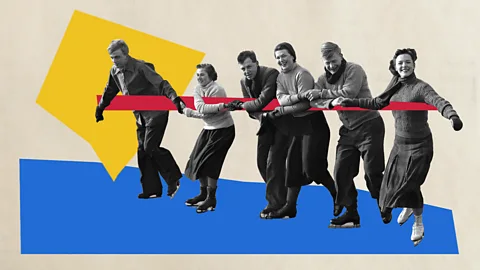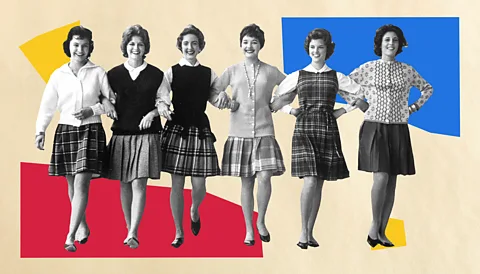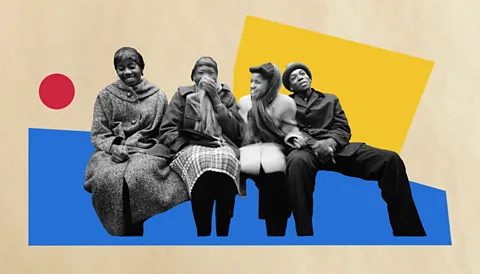A four-day science-backed guide to forging better friendships that will improve your life
 Javier Hirschfeld/ Getty Images
Javier Hirschfeld/ Getty ImagesFriendships can bring some surprising benefits to our health. Here's how you can make new friends and strengthen the ones you've got already.
Health, exercise and diet reliably sit at the top of most people's New Year's resolutions – but for 2025, some may consider prioritising another goal: better relations with other people.
Boosting the strength and quality of our social ties can have a huge impact on our emotional and mental health. As one of our writers, David Robson, notes, our friendships can "influence everything from our immune system's strength to our chances of dying from heart disease", and can even help us lead a longer life. Close bonds with spouses and dear friends, but also friendly relations with acquaintances, colleagues and neighbours are all beneficial, suggesting it's worth trying to find common ground even in these polarised times. And in the midst of an apparent loneliness epidemic, it could be the medicine we all need.
Here is our four-day guide to help you jump-start your social life in 2025 – or to simply feel more connected with the world. After all, many types of relationships can bring us joy, opening us up to the world around us by connecting with nature, connecting with animals, and importantly, connecting with ourselves.
Day 1: What are your friendship goals and expectations?
When our writer Molly Gorman interviewed friendship researcher Grace Vieth about break-ups between friends, she learned that there's one thing many of us could do to improve our networks: get better at dealing with conflict. As Vieth says: "I think that a lot of people have a mindset that they're willing to work through conflict in romantic relationships". But when it comes to friendship, we may just expect things to "be easy and bring a lot of joy, fun and laughter", Vieth explains – leading us to mistakenly think that if there's conflict, the friendship itself is flawed.
It could be a good idea to take some time to think about what friendship means to you – and what you expect from yourself and others in a friendship. Molly's piece has lots of research-backed information on handling the ups and downs of being friends – and, should it come to it, dealing with and learning from the end of a friendship and its aftermath. (Read her full article here.)
Encouragingly, making friends is in fact something that can be learned and mastered over time – in fact, later life can be a golden age for friendship, as research suggests we become better at getting along with others. "People over time gain social skills," says Katherine Fiori, a professor of psychology at Adelphi University, New York. You could read our piece on how our friendship strategies change over our lifetime, and consider if your own social goals fit your current needs – or if it could be worth modifying them.
Having reflected on your friendship expectations and goals, do you think that you're a good, supportive friend to others? If you're not sure, here are some research-backed tips to boost your own friendship skills.
One powerful trait among supportive friends is "confelicity", from the Latin word for "shared happiness". It simply means taking the time to really express joy at other people's good news, as well as sharing your own positive feelings with them. If you'd like to bring more sparkle to your friendships in 2025, finding opportunities for confelicity could be a good first step. Is there someone who recently shared good news with you – but your immediate reaction could perhaps have been more enthusiastic? You could still send them a message saying that you were really pleased to hear about their success or mention it next time you meet. (Read our full piece on being a supportive – and not toxic – friend.)
 Javier Hirschfeld/ Getty Images
Javier Hirschfeld/ Getty ImagesAnother way to add warmth to your connections could be to repair past wrongs, by saying sorry. As our tech specialist Thomas Germain found out, robots are actually surprisingly good at coming up with effective apologies – while many humans struggle with that. But we humans may have one advantage: we can show in many ways that while imperfect, our apologies come from the heart. As Judy Eaton, a psychology professor at Wilfrid Laurier University in Waterloo, Ontario, Canada, told Thomas: "Apologies aren't just about saying the right words, it's about bringing in the physiological responses of what researchers call 'psychic pain'. If you're truly remorseful, it hurts. If that pain doesn't come through in the apology, people can detect that it's not a real manifestation of vulnerability." (And if you're not sure how to say sorry without making things worse, read Thomas' full article on apologising effectively).
Friendship special
Amid the loneliness epidemic blighting many parts of the world following the pandemic, the BBC looks at how friendships can enrich our lives – and the science-backed ways to boost our social connections:
For people who struggle in social situations, connecting with others over shared interests can be a way to bond without having to put yourself at the centre of the interaction. Since friends strongly shape our habits and values, meeting new people over a shared hobby could also potentially tick off two New Year’s resolutions in one go: making new friends, and cultivating a new hobby.
Bonding with other students in a language class, for example, helps people persevere with the class and eventually master the language, according to experts on successful language-learning. (If you're worried that you're too old to learn a new language, read this article – you're not, and in fact, older learners have certain advantages over younger learners.)
Exercise can be another activity with a double benefit – meeting people and staying fit. Team sports in particular are associated with improved social and mental health. This applies to people of all ages and abilities, including those with disabilities. Last year, we took the Olympic and Paralympic Games in Paris as an opportunity to report on a vast range of fitness-related topics, from how to run faster, to staying safe and healthy as an athlete with disability. The overarching message: exercise can be a great social activity, it's great for mental and physical health, and we should probably all do more of it.
Learning an instrument is another activity that's fun and can benefit the brain, and open up opportunities to connect with others. So, on day three, how about picking a new activity, or reviving an old one, and making a plan for how to pursue it over the course of the year?
Shared rituals are another way to strengthen relationships, researchers have found – and even tiny ones, such as clinking your cutlery together before you eat or a special greeting, can make connections more durable and satisfying. (Read the full story on the power of rituals here).
Day 4: Connect with nature
On day four, it could be time to turn towards nature. Blue spaces such as lakes, rivers and oceans, and specially designated Dark Sky sites that have low levels of light pollution, can all boost our wellbeing. Time spent in nature has even been found to help people make social connections, providing a tonic for loneliness, as writer Julia Hotz revealed in her article. And we can return the favour, by helping the plants and animals around us.
Sometimes, all it takes is a flick of a switch: turning skyscrapers and residential homes dark can save the lives of billions of birds as they migrate through our cities. It could also allow you to experience the wonder of night's sky for yourself. Experiencing awe and wonder at the Universe around us can help to bring people closer together, encouraging more altruistic behaviour and reducing self-centric attitudes, as David Robson explains in this elegant article about the power of events like a solar eclipse.
As migration ecologist Andrew Farnsworth told our reporter Riley Farrell: "We need to keep our connection to nature through our eyes, ears, nose", opening our senses to the awe-inspiring behaviour of birds and other creatures. (Read the full story on the Lights Out campaign in US cities, and its surprisingly powerful impact – as well the connections it has created between bird fans in many cities.)
 Javier Hirschfeld/Getty Images
Javier Hirschfeld/Getty ImagesOur correspondent Katherine Latham experienced this kind of helping-hand connection on a tiny but thrilling scale, when she built a minuscule garden pond – and a frog moved in. (At the other end of the scale, a family with a castle in England rewilded an entire ancient estate, and previously extinct storks have made their home there.) Even in dark, cold January, there are many ways to help animals – bird feeders have pros and cons, but a simple alternative can be to grow wildlife-friendly plants.
For some, connecting with nature can be profoundly transformative, and heal deep wounds. Tiana Williams, a member of the Yurok Nation, told our correspondent Lucy Sherriff about a very special wildlife connection that brought joy to her tribe: bringing back the condor, which the Yurok Tribe considers a sacred animal. As Williams says, for her young daughter, "condors have been part of her whole life. One of her favourite games growing up was pretending she was a baby condor and I was condor mum. So, it's just part of her story… The condor is not only here in reality, but they're here in our hearts again."
Such a deep ancestral connection with a sacred animal is an especially precious bond, and part of many indigenous traditions. But all people and all communities can benefit from cultivating closer ties with nature – by enjoying the marvels our planet has to offer.
Whether it's reaching out to an old friend, starting a sociable new hobby, or simply observing the world around you and noticing opportunities to connect with it, we hope your year will be filled with the joy of good company. And if you're up for a few more wellbeing steps, here's our guide to improving other parts of life, one day at a time.
--
If you liked this story, sign up for The Essential List newsletter – a handpicked selection of features, videos and can't-miss news, delivered to your inbox twice a week.
